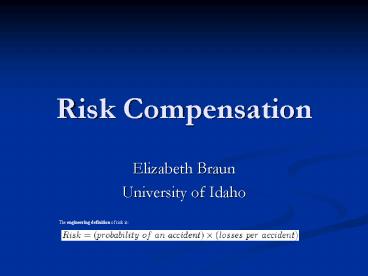Risk Compensation
1 / 17
Title: Risk Compensation
1
Risk Compensation
- Elizabeth Braun
- University of Idaho
The engineering definition of risk is
2
Risk Compensation
- Homeostasis
- Risk Homeostasis
- Risk Homeostasis Theory
- Opponents
3
Homeostasis
- Walter B. Cannon (1929)
- Greek words same steady
- Dynamic process
- Matches actual output to a target
- Self-correcting using negative feedback
4
Homeostasis Model
Comparator
Expected Costs and Benefits of Alternative
Temperatures
Desired (set) Temperature
Desired Adjustment a-b 0
Quality of Switch Function, Inertia
-
Temperature Reading on Thermometer
Adjustment Action
Sensitivity of Thermometer
Heating Capacity of Furnace
Resulting House Temperature
Lagged Feedback
5
Risk Homeostasis
- GSR Galvanic Skin Response
- Electrodemal response (EDR)
- change in skin conductance (electrical
resistance) - Measure of degree of risk, fear, anger, sexual
feelings - One component of polygraph
6
Risk Homeostasis
- Donald Taylors Driver study
- Accident rate per vehicle mile
- GSR rate per mile
- Average Speed
- Driver Study Correlations
- Between Accident rate per vehicle mile GSR rate
per mile - 0.61- 0.89 - Between Accident rate per vehicle mile Average
Speed - -0.67 - -0.74 - Between GSR rate per mile Average speed - -0.75
- -0.92 - Drivers kept risk stable
7
Risk Homeostasis Theory
Comparator
Perceived Costs and Benefits of Action
Alternatives
Target Level of Risk
Desired Adjustment a-b 0
Decision making skills
-
Adjustment Action
Vehicle handling skills
Perception skills
Perceived Level of Risk
Car Road Design
Resulting Accident Toll
Lagged Feedback
8
Risk Homeostasis Theory
9
Motivating Factors
- Risky Behavior
- Expected Advantages
- Expected Costs
- Safe Bahavior
- Expected Benefits
- Expected Costs
10
Risk Homeostasis Theory
Comparator
Perceived Costs and Benefits of Action
Alternatives
Target Level of Risk
Desired Adjustment a-b 0
Decision making skills
-
Adjustment Action
Vehicle handling skills
Perception skills
Perceived Level of Risk
Car Road Design
Resulting Accident Toll
Lagged Feedback
11
Target Level of Risk
- Deliberately Pursued vs. Passively Accepted
- Long-lasting
- cultural, economy, socio-economic status,
incentives to be accident free, occupation, age,
gender - Shorter-term
- Purpose, arrival urgency,
- pre-occupations, mood, fatigue, alcohol
- Momentary
- Traffic, good progress
12
Risk Homeostasis Theory
- Perceived Level of Risk
- Past Experience
- Persons assessment
- Degree of confidence
- Comparator
- Just Noticeable Difference
- Immediate effects
- Long-term effects
- Risk under / over estimators
Comparator
Target Level of Risk
-
Perceived Level of Risk
13
Risk Homeostasis Theory
Decision making skills
- Resulting Accident Toll
- Sum of actions
- Implications
- Accident
- Risk
- Skills
Adjustment Action
Vehicle handling skills
Car Road Design
Resulting Accident Toll
Perception skills
Perceived Level of Risk
14
Risk Homeostasis Theory
- Explains accident rate
- Closed Loop process between loss caution
- Motivate by accident counter measures to act more
safely - Reduce peoples willingness to take risks
Comparator
Perceived Costs and Benefits of Action
Alternatives
Target Level of Risk
-
15
Art of effective safety management is the art of
reducing the target level of risk
Target Level of Risk
16
Opponents
- This theory is so bizarre...not a theory
- A more productive approach determine under
which conditions behavior is altered to maintain
level of risk - As credible as the flat earth hypothesis
- ONeill, B Williams, A, (1998). Risk
homeostasis hypothesis a rebuttal. Injury
Prevention, 4, 92-93. - All the data examined are found to be
incompatible with the risk homeostasis theory - Evans, L, (1996) Risk homeostasis theory and
traffic accident data. Risk Analysis, 6,1,81-94.
17
Uses
- Objective Personality Test
- Hergovich, A, et al. (2004). Zur dimensionalität
und konstukvalidität eine videobasierten,
objektiven persönlichkeitstests zur messung der
risikobereitschaft im straßenverkehr (The
construct validity of a video based, objective
personality test as a measure of risk-taking in
traffic) Zeitschrift für differentielle und
diagnostische psychologie, 25, 2































